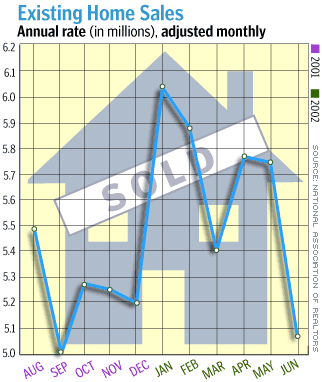NEW YORK (CNN/Money) -
Sales of existing homes in the United States plunged in June, a realty group said Thursday, as the red-hot housing market finally began to cool from record levels earlier in the year -- though a separate report showed new home sales rose in June.
The National Association of Realtors said existing home sales fell to an annual rate of 5.07 million units in June from 5.75 million units in May. Economists expected sales at a rate of 5.75 million units, according to Briefing.com.
| |
 While housing's still hot...
While housing's still hot...
| |
| | |
| | |
|
The drop in existing home sales was the biggest since a 12.5 percent drop in April 1995, the NAR said -- but the first five months of 2002 were among the hottest for sales since the group began keeping track in 1968.
"After experiencing record highs during the first part of the year, existing-home sales were bound to eventually decline to more sustainable levels," NAR chief economist David Lereah said.
"It's now clear that unusually mild weather in January and February contributed to exceptional home sales, in effect borrowing from sales that normally would have occurred in late spring," Lereah added. "Even so, we still expect to set a new annual record this year."
Though existing home sales fell, the median price for an existing home rose to $163,500, up 7.4 percent from $152,200 a year ago.
Separately, the Commerce Department said new home sales rose 0.5 percent to a 1 million-unit annual rate in June, compared with May's revised 996,000-unit pace. Economists expected the pace of new-home sales to fall to 980,000, according to Briefing.com.
Still, new home sales are just a small part of the overall housing market, and it was difficult to find a silver lining in Thursday's surprisingly weak existing-home sales report, coming as it did with other data on durable goods and jobless claims that painted a mixed picture of the economy's health.

"This puts to rest any question of whether or not we're going to have an explosive recovery," said Anthony Chan, chief economist at Banc One Investment Advisors. "We're clearly not."
Persistently low mortgage rates have helped keep demand for houses -- and home prices -- high. Higher home values have made homeowners feel richer, encouraging them to spend and boost the broader economy. Low rates also have fueled a boom in refinancing, which has put more money in consumers' pockets.
The fixed rate for a 30-year mortgage fell last week to the lowest level in at least 31 years, according to mortgage security firm Freddie Mac (FRE: down $2.79 to $55.80, Research, Estimates), which would seem to be nothing but good news for housing -- coupled with the new-home sales data, the plunge in mortgage rates only makes Thursday's existing home sales data more bizarre.
"The extent of the drop seems overdone," said Joel Naroff, president and chief economist at Naroff Economic Advisors in Holland, Pa. "I would not be surprised if home sales rebound, though the days of record sales levels may be behind us."
Any significant weakness in the housing market could be real trouble for the economy, since homes have become an alternative form of investment for many Americans trying to escape persistent stock-market misery.
Chan of Banc One said studies have found that every dollar gain in stock wealth increases consumer spending by about 3 to 5 cents, while every gain in housing wealth increases spending by about 11 to 17 cents.
Thus, according to Chan's calculations, the loss in recent years of $7 trillion in stock wealth should have translated into a $280 billion drop in spending, while the $2.7 trillion gain in home equity should have boosted spending by about $378 billion -- a net gain of $98 billion.
Consumer spending fuels two-thirds of all U.S. economic activity and helped make a recession that began in March 2001 one of the shortest and mildest in U.S. history.
Though many economists think the recent plunge in stock prices was largely disconnected from the broader economy, there is growing concern that an extended bear market could stunt consumer confidence and spending.
"There's no question that what's happening in the stock market is going to hurt consumer spending," Chan said. "The only thing helping us is the performance of housing."

|

